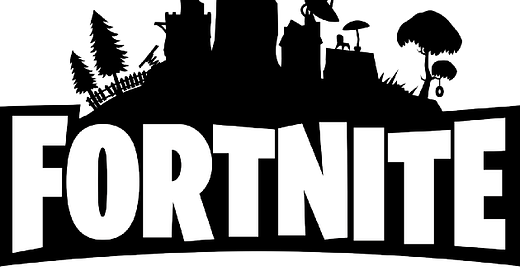This article was originally featured on Medium in March of 2019, and Fortnite has lost some of its juice since then, but the underlying premise of solving our culture war problems via directing our fixed attention supply in other directions came up two days ago in a podcast recording between Benjamin Boyce and I, so it seemed timely to migrate.
I’ll post a link to the podcast when it goes live.
This article is weird. Please bear with me, because it’s hopeful, and hope is good, and in woefully short supply even among the people like you and I who are trying their best not to peddle despair. We’ve crafted an analysis of the current human condition that’s fairly grim in the past year, across a myriad of articles, so before we get to the hope, let’s recap the grimdark in plain English before we pivot to talking about video games.
In the Grim Dark Future of 2020, There is Only (Culture) War
We are all addicted to our smartphones. They are very finely crafted to suck our attention. We get a dopamine fix from even turning them on, and we get a larger dopamine fix from liking and sharing things. The more time we spend on them, the more of our actual lives are influenced by the virtual space, and the virtual space is very different than the real space. In real space, homicides are at historic lows, terrorism is barely a thing, mass shootings are fabulously rare, and gun ownership doesn’t really matter all that much in the numbers. In real space, chromosomes dictate biological sex, men and women have statistically measurable differences in their interests, and the impact of Isms (sexism, racism, Islamism, communism) on our modern lives are also historically low for most people. In the real world, who we are is a blend of nature and nurture, a blend of genetic capabilities and behavioral predispositions, and of white space into which givens, thoughts, and behaviors are installed.
But there’s a problem. The phones are controlled by companies who want you to use the phones more, so there’s a feed. They call it a feed for a reason, because it’s a conveyor belt that feeds you brainstuff, and your brain eats it, and installs it into that whitespace. And they get the most money when you eat the most brainstuff. This requires your attention.
The content creators of the brainstuff, largely dominated by what we might call legacy media outlets, have a deep psychological understanding of what makes you share the brainstuff in your feed to your friends’ feeds. Anxiety and fear drive sharing, sharing drives traffic if it fits certain echo chamber narratives, and their entire business model is based around clicks. And when people like your shares, you get yet more dopamine, so you become addicted to the anxiety and fear. And Facebook rises to fill that market demand, as if by magic.
Furthermore, no media outlet can bail on this business model, because they’re competing for market share in a limited resource space — the fixed resource of human attention spans. A classic “tragedy of the commons” problem develops, because people’s attention hours don’t scale with the amount of available media, and there’s no way to control the number of media sources competing for that attention resource. They can’t back away from peddling outrage porn, because if they did, they’d lose market share, so we all march hand in hand towards internecine violence, the dead rising from the grave, human sacrifice, and dogs and cats living together. Mass hysteria.
This overall analysis framework, less perhaps the doomsaying and Ghostbusters quotes, is apparently permeating the big dogs within the “Attention Economy” itself, and that’s where our story may turn surprisingly towards the better.
WTF is Fortnite Anyway?
Fortnite is a very, very successful video game.
“That’s some shooter game that kids play and do dances, right?” Au contraire, mon frère.
I mean, yes, it is in fact that. But it’s more. It’s not anywhere near as beautiful, deep, and perfect a game as Zelda: Breath of the Wild, but the guys who cooked Fortnite up are either geniuses, or very lucky.
When I was in sixth grade in an urban Atlanta burb, we did the MC Hammer. We did it on the playground. We did it in the halls. We did it on the bus when the bus driver wasn’t looking. You remember the MC Hammer, right? Of course, you do.
If you are remotely within my approximate age band, deep behavioral triggering will probably activate if a random person on the street walks up to you and says:
Stop.
Hammer time.
You might in fact start dancing. At the minimum, you may have to mentally quell the urge, which was installed in the whitespace of your head by MTV, combined with infrastructure and business hierarchies in the form of RIAA and the record labels. Fortnite is that powerful, and they got there from a unique blend of game design elements and business tricks.
One:
They stole a good idea.
In the deep belly of video game culture, we find people called “modders.” They’re deeply committed video game addicts with coding skills, who take games they like and create “mods” of them, remixing them into game variants, or totally new games. It’s their hobby. In 2013, some modder called “PlayerUnknown” cooked up a shooter mod based on a Japanese book/movie called “Battle Royale.” Some people maintain that Hunger Games itself was a Battle Royale rip-off. For our purposes, accept that if you know Hunger Games, you know the plot. Everyone gets stuck inside a boundary with no starting weapons and tries to kill each other with whatever they find. Last man standing.
This mod went so big that PlayerUnknown (a.k.a. Brendan Greene) found his way into building a new video game around the concept: PlayerUnknown’s Battlegrounds, or PUBG. Being developed in South Korea, it went very big there, and going big there means you get big everywhere, so this game got very big.
Fortnite was over on the side — a bit of a team survival game where you bash down materials and make forts. A nicer looking, somewhat different, Minecraft. They stole the Battle Royale idea from PUBG, shoehorned it into their game, and by March of 2018, had overtaken PUBG in terms of market share.
Two:
They made it cartoony.
Adults don’t hate cartoony games. Just ask Super Mario. But they very much dislike their kids playing gory ones. Just ask Skyrim. In choosing “cartoony,” they had a wider market.
Three:
They gave it away for free.
You can install Fortnite Battle Royale right now, for free, on any device you own. Try it.
That’s the foundation — combine all that in a blender. Parents are more likely to let their kids play this game than any other game out there, because it passes the “cartoony” test, and they don’t have to pay for it. It becomes popular among adults because it’s cross platform, accessible by anyone, and has addictive gameplay. Also again because it’s free. It becomes popular among adults with kids because it hits that sweet spot of Aging Gamer Wants To Spend Time With Children But Hates Pokemon. Playing it is no harder than installing Netflix on your Roku. We’ll return to Netflix below.
And then, once they had everyone’s attention, they plopped in MC Hammer. For a tiny bit of money, you too can do “the Floss” while you’re running for your life, building buildings, and terrorizing your opponents. The circle is complete, to the tune of two hundred and ten million dollars per month, and all they’re actually selling is dances, costumes, and fluff. In 2018, they basically matchedMTV’s gross earnings at their 1997 peak. Just that one game. And they have way more viewers. Fortnite has 125 million players world-wide, and pegs out at over three million players actively playing at times.
International soccer players did Fortnite dances in the World Cup. NFL players followed suit. Major League Baseball has been screaming about Fortnite addiction in their players since last May, and are now worried about it literally infecting the clubhouse itself. Baseball players are playing Fortnite during games. Probably some spectators too, because let’s face it, baseball is boring.
The executives in the rest of the Attention Economy are freaked out, but I’m not. I wonder if we can conceive a way to leverage this thing to escape the spiraling culture war.
Fortnite as a Template for Culture War Armistice
Bijan Stephen wrote one of the best articles I’ve read in months on The Verge, unwittingly, about this topic. Unfortunately for Mr. Stephen, he probably never thought his article would be yanked whole hog from the corners of gaming industry publication and used as a template for overall culture war analysis. Tough luck, Bijan, buckle your seatbelt.
The attention economy is dying, and it’s not pretty; there is only so much time in the day to pay attention to things, and we as a society have reached the limit. (By things I mean ads.) Fortnite, though, has managed to stay culturally relevant and even grow since its 2017 launch — which is unusual. And that’s because its creator, Epic Games, has figured out how to get people to keep paying attention.
Wait, you mean there are other ways to monopolize people’s time than feeding them fear and anxiety through their smartphones? This is culture war armistice genius, and it flows from a wider look at the Attention Economy than the current legacy media companies, nor even I as a supposed culture war analyst, have been taking.
Mr. Stephen, do tell!
“Paying attention” was a phrase before it became a literalization, before canny people realized just how much money time is worth. The advertising industry — and therefore the industries it supports, like the media — is predicated on the idea that if you’ve heard of something and have a positive association with it, you’re more likely to buy the product or the experience. And that isn’t wrong: people make decisions for reasons unfathomable even to themselves all the time. It makes sense to monetize humanity’s fundamental irrationality. (Sucks to the economists who peddled the Rational Consumer model of microeconomic behavior!) But the base assumption that the whole edifice is built on is becoming unstable, because what happens when society’s attention is entirely monopolized?
Clearly the answer is internecine violence, the dead rising from the grave, human sacrifice, and dogs and cats living together! Mass hysteria. Or not?
A recent report put out by the media and technology research firm Midia underscores that point: “[E]ngagement has declined throughout the sector, suggesting that the attention economy has peaked. Consumers simply do not have any more free time to allocate to new attention seeking digital entertainment propositions, which means they have to start prioritizing between them.” The trend, they write, has persisted for a while, and only now promises a revenue slowdown — as told through disappointing quarterly results from a few of the major games publishers. “Arguably sooner than most of the games industry would have thought.” As Midia analyst Karol Severin says, “competition within the attention economy is now more intense than ever before.”
The problem is attention doesn’t scale.
That’s almost verbatim out of a HWFO article. Actually, we wrote that article, albeit not about video game publishers running into that boundary, but rather about the legacy media running into it.
Enter Fortnite. As the most popular game in the world — or at least the most well known — it represents a substantial portion of the attention economy. Fortnite is ubiquitous among the under-18 set, and its microtransactions have reaped billions in profits for Epic Games. It really can’t be overstated just how popular the game is among young people: it’s become a shared culture, with all the in-jokes, references, and coded language that entails. If you’re around two or more kids, the chance that they’ll do a dance from the game grows astronomically.
But Epic’s real genius is in how it markets to the game’s young audience: Fortnite is, above everything else, a place to hang out with your friends. That’s why it isn’t weird that Weezer is playing unreleased songs on an in-game island, and nobody bats an eye when the DJ and producer Marshmello plays a concert in a virtual park.
The game’s immense popularity, and its status as a hang-out spot, has its competitors in the attention economy worried. Last month, Netflix mentioned in its 2018 earnings report that “we compete with (and lose to) Fortnite more than HBO.” As Polygon noted then, Netflix sees the game as its “stiffest competition” because, to the streaming giant, the most valuable consumer metric is screen time. If people are playing Fortnite, they can’t be watching Netflix.
Nor can they be disconnecting from actual reality to watch outrage porn on their smartphones.
Perhaps our committable attention hours to outrage porn masquerading as “news” isn’t a fixed quantity after all. Perhaps our attention hours to all things is a fixed quantity, and if things other than outrage porn steal more of the attention span within the overall attention economy, the freakoutery goes down. Perhaps the path to a culture war armistice isn’t merely more reality, it’s also more Fortnite-ish things.
What Does This Look Like?
The reason we play video games instead of movies is because they’re interactive. Interacting with things is more fun that watching them passively. There’s more dopamine high from playing a shooter than watching an action movie, just like there’s more dopamine high from playing a sport than watching sports. The juice people get from sharing fear and anxiety on Facebook and Twitter is from the interaction of it. In some ways, the social feeds are akin to interactive news — it’s news with a dopamine high granted by participation. Instead of simply kicking Facebook’s table over, what’s needed is a better “game” (read: more dopamine per minute played) targeted at the interactive-news addicted demographic.
We need OutrageNite.
Somebody write that game please. I guarantee there’s a market for it.







OutrageNite is what 4chan was, and it simply cannot last without some kind of high-octane gamification, with features from Discord (private community scaling effect), Twitter (open concept synthesis), and Reddit (effort reputation system), ala Amino (the app). But sadly it went the route of Fandom and gone docile and disorganized.
Fortnite still occupies attention. The Apple dispute hurt, but https://www.businessofapps.com/data/fortnite-statistics/ notes $5B in revenue now decreaed slightly with ~ 350M addicts. I must admit that I have no time and have been preoccupied with CoV research as it evolves. Since CoV became essential a political proxy it's mixing of science, religion and politics has been fascinating. As you note we only have so much time. I've maxed out TV politics because my favorite dramas are idle. Telegram keeps FOMO alive. The flood of contrary information makes me yearn for simpler times.